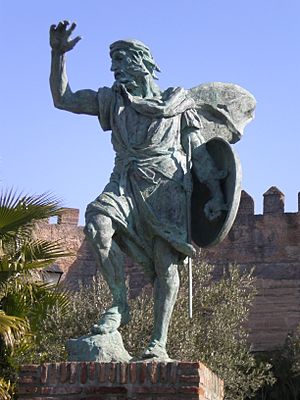Ibn Marwan al-Jilliqi facts for kids

‘Abd al-Raḥmān ibn Marwān al-Jillīqī (also known as "the Galician") was an important leader who lived a long time ago, around the 800s. His family came from northern Portugal and settled near a city called Mérida in Spain. He was a Muwallad, which means he was a person born in al-Andalus (the parts of Spain ruled by Muslims) whose family had both Muslim and Christian roots.
Contents
Early Life and Rebellion
In 868, Ibn Marwan led a group of Muwallads and Mozarabs (Christians living under Muslim rule) in a rebellion. They were fighting against the ruler of the time, Muhammad I of Córdoba, who was the Emir (a powerful leader) of Córdoba.
Ibn Marwan and his followers fought bravely. After a strong resistance, they managed to get good surrender terms from the Emir. As part of the agreement, Ibn Marwan was given the city of Badajoz. He immediately started to make the city stronger by building defenses.
Moving North and Gaining Allies
Ibn Marwan soon learned that the Emir's army was planning another attack. To prepare, he moved north to a castle called Karkar (which is now Carquere in Portugal). From there, he asked for help from King Alfonso III of León, who was a Christian ruler.
King Alfonso III sent troops to help Ibn Marwan. Their combined army then fought against the Emir's forces and won a big victory.
Establishing His Own Rule
After his victory, Ibn Marwan returned to Badajoz. By this time, the city was much stronger and well-protected. He then began to establish his own rule over a large area known as the Al'Garb Al'Andalus, which covered much of what is now southern Portugal and parts of Spain.
Ibn Marwan also worked with another important Muwallad leader named Sāʿḍūn al-Ṣurunbāqī. Together, they forced the Banu Dānis family out of Coimbra, another important city. Between 876 and 877, Ibn Marwan also built a castle in Portugal called Marvão. This castle was known even in the 900s as Amaia de Ibn Maruán, or "Fortress of Amaia," showing how important he was. His family continued to rule in the region until about 930.
See also
In Spanish: Ibn Marwán para niños
 | Aaron Henry |
 | T. R. M. Howard |
 | Jesse Jackson |

